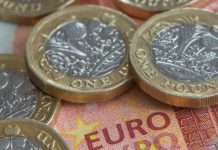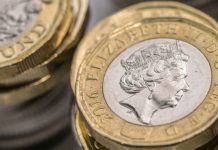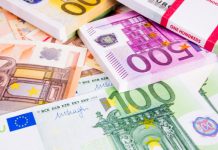- Pound (GBP) is rising for a second day
- UK retail sales rose 0.5% in July
- Euro (EUR) falls across the week
- Eurozone trade balance surplus increases to €22.3bn
The Pound Euro (GBP/EUR) exchange rate is rising for a second straight session. The pair rose 0.57% in the previous session, settling on Thursday at €1.1711 and trading in a range between €1.1643 and €1.1719. At 12:00 UTC, GBP/EUR trades +0.25% at €1.1742. Te pair is on track to rise 0.47% across the week, snapping a 4-week losing run.
The pound is rising after UK retail sales rebounded in July boosted by higher spending in department stores and on sports equipment following bad weather earlier in the summer.
According to data from the Office for National Statistics, Retail sales rose 0.5% month over month in July after a revised contraction of 0.9% in June. The reading was in line with expectations.
The rise in retail sales comes as low inflation continues to support real incomes and boost consumer confidence. Inflation in the UK has eased to 2.2%, down considerably from the double-digit inflation at its peak last year. Meanwhile, wage growth remains strong, which is also helping to lift consumption.
Consumer spending is a key part of the UK’s economic performance, and the data comes after a big week for UK data, which included economic growth, inflation, and wage growth. The GDP data from the ONS showed that economic growth remained strong in the three months to June after a strong start to the year and following a technical recession at the end of last year.
The euro is falling despite data showing that the trade balance for the eurozone region rose to a €22.3 billion surplus in June, up from €18 billion a year earlier. Exports fell less than imports, recording a 63% drop to €236.7 billion in June. Meanwhile, imports fell by 8.6% to €214.3 billion.
Delving deeper into the data, June’s trade balance was boosted by a surplus of products like chemicals, machinery, and vehicles.
A trade surplus is often a positive indicator for an economy and means there is demand for its goods in the global market, which can help boost employment and growth





